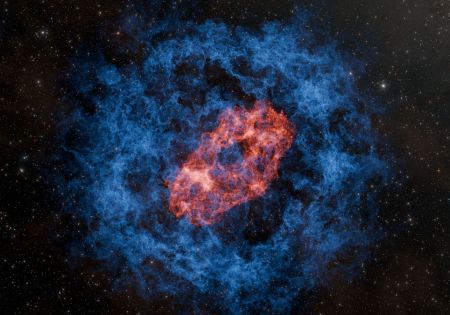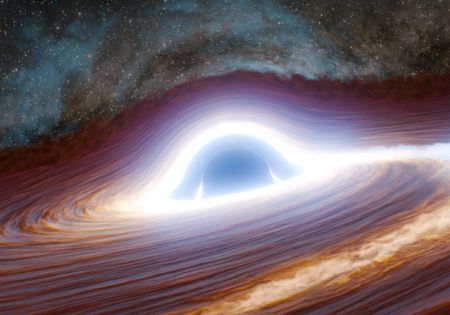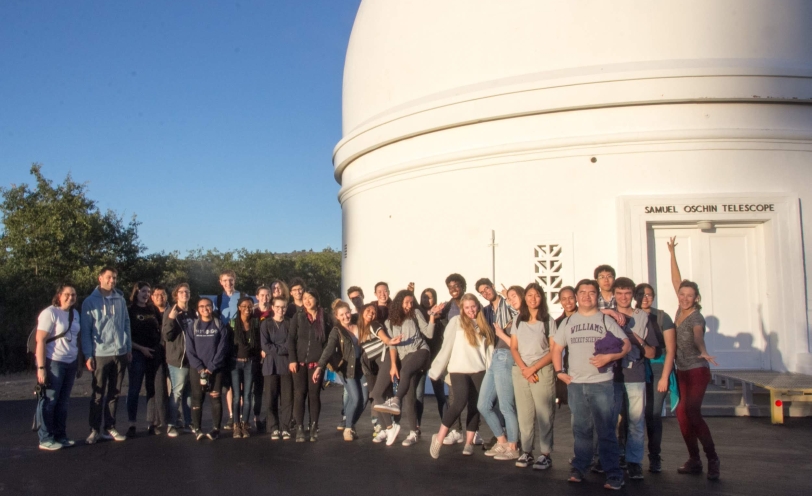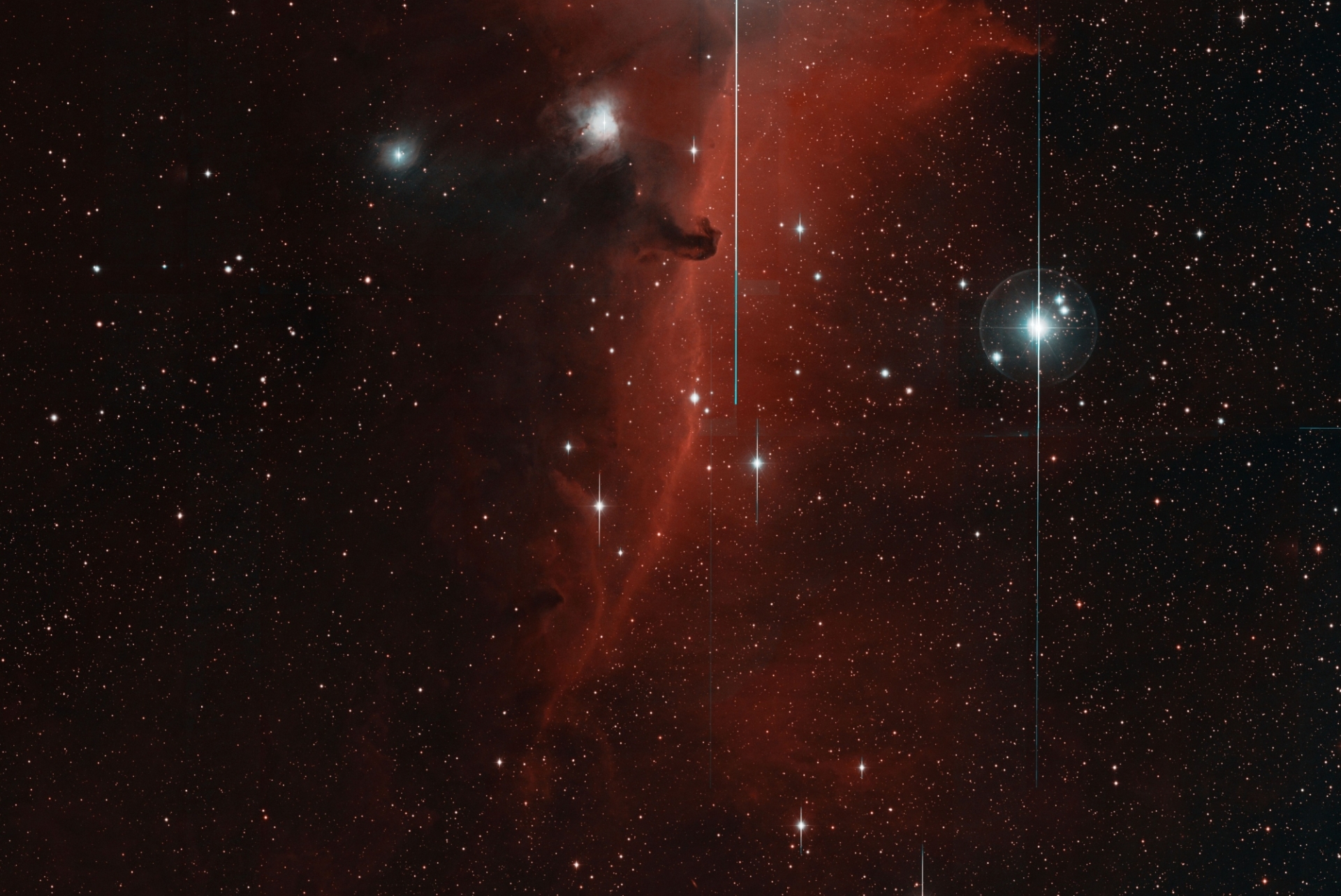Call for Proposals
The ZTF Scientific Steering Committee invites proposals to the “ZTF Experiments” program from the global astronomical community. These proposals should explore one or more novel aspects of ZTF scientific/technical capabilities by employing non-standard field selection, cadence, and filter choice to pursue specific scientific questions. LEARN MORE
What is ZTF?
The Zwicky Transient Facility (ZTF) is a public-private partnership aimed at a systematic study of the optical night sky. Using an extremely wide-field of view camera, ZTF scans the entire Northern sky every two days. The resulting large area survey will enable the astronomical community to pursue a broad range of time-domain science ranging from near-Earth asteroids to the study of distant superluminous supernovae. ZTF is funded in equal part by the US National Science Foundation and an international consortium of universities and institutions.
Extreme Field of View
ZTF employs a custom-built mosaic CCD camera which utilizes the entire focal plane (~ 47 sq deg) of the P48 telescope at Palomar, providing the largest instantaneous field-of-view of any camera on a telescope of aperture greater than half a meter.
Read MoreUnique survey
ZTF scans the northern sky at high cadance (~2 days) to produce a comprehensive, multi-filter survey. ZTF delivers bi-monthly public data releases of high quality and reliable data products to enable time-domain science.
Read MoreMachine Learning & Dedicated Followup
Data pipelines incorporate machine learning algorithms to sieve through billions of individual astrophysical sources and send candidates for dedicated and automated followup and classification.
Read MorePowerful collaboration
The ZTF partnership has formed a strong, scientifically diverse collaboration with partners from the USA, Europe and Asia. This large multidisciplinary team also offers access to an extensive network of followup resources.
Read MoreFeatured Video
Discovered so far...
Classified Supernovae
Tidal Disruption Events
Near Earth Asteroids & Comets
Ultra-compact Binaries
Featured Datasets
12 March, 2025
The Zwicky Transient Facility (ZTF) has released Zubercal (ZTF-ubercal), a new set of photometry based on a detailed recalibration of ZTF Science image-based PSF photometry. This dataset includes all ZTF detections from DR20 that have been matched to Pan-STARRS1 (PS1) sources (< 1.2”) and contain color information. For more details, refer to the Zubercal documentation. Zubercal is now available for bulk download on the IRSA ZTF mission page.
14 Feb, 2025
The Cosmolog group in ZTF releases its second supernova release containing 3628 highly sampled Type Ia supernovae. The data was acquired by the Zwicky Transient Facility in the period of March 2018 and December 2020. To date, this is the largest and most homogeneous dataset of thousands of density sampled and well calibrated Type Ia supernovae light curves, spectra, host properties, and observing logs. The dataset is available to the entire astronomical community as a resource to enable researchers to refine models and develop new techniques to enhance the precision and accuracy of distances derived from SN Ia observations.
The Bright Transient Survey (BTS) is currently the largest spectroscopic supernova survey with over 10000 objects.
Quick Access
BABAMUL
A real-time multi-survey alert broker for the LSST era
Babamul is a public alert brokerthat delivers a crossmatch between the LSST and ZTF alert streams prior to filtering.
Science
Themes
Science activities in ZTF are organized and managed by seven science working groups (SWG). These are:
Science Vlog
Cosmic Newsflash is the ZTF newsletter for the large time-domain astronomy community that uses ZTF public data. Timed with our public data releases, it includes practical information about the release, a summary of science highlights from the ZTF partnership, updates from operations, a spotlight on team members and more.
News & Announcements

Dec 16, 2025 | Category: News
Astronomer may have spotted a rare hypothesized merger
A superkilonova is cosmic merger in which a kilonova (two neutron stars colliding) is preceeded by a supernova that creates the neutrons stars. Such an event has been hypothesized but never seen. Stiching together data from LIGO/Virgo and multiple optical telescopes, astronomers report that their observations suggest we may have seen a superkilonova for the first time.

Dec 12, 2025 | Category: Press Release
Astronomers see gravitationally lensed superluminous supernovae for the first time
In late August this year, the ZTF was routinely scanning the night sky when Joel Johansson from the Oskar Klein Center reviewed the data and stumbled upon an interesting explosion. Little did he know at that time that he was seeing the first observations of a gravitationally lensed superluminous supernovae.

Nov 4, 2025 | Category: Press Release
Black Hole Flare is Biggest and Most Distant Seen
ZTF has co-discovered the most distant and brightest flare from a black hole eating away a massive star. The event has taken place in the distant universe 10 billion light years away and at its brightest, it release the energy equivalent to 100 trillion suns.
Outreach
Our global team and varied science provide excellent opportunities for outreach. In ZTF phase II, we continue to run our ZTF summer schools designed to provide PhD student with hands-on skills in data processing and analysis of ZTF data. Partners in our global network welcome undergraduate students every summer under the flagship of various summer research programs. Students conduct not only a wide variety of research reflected by the breadth of science activities in ZTF, but they also learn how to be part of international collaborations. At Caltech, we also participate in various outreach activities focusing on high school students. We also engage in public outreach via projects on Zooniverse. By the end of ZTF phase II we plan to launch a new web tool/mobile app designed to let the general public learn more about the dynamic sky.
ZTF summer school ZARTH mobile gameStudent Opportunities


